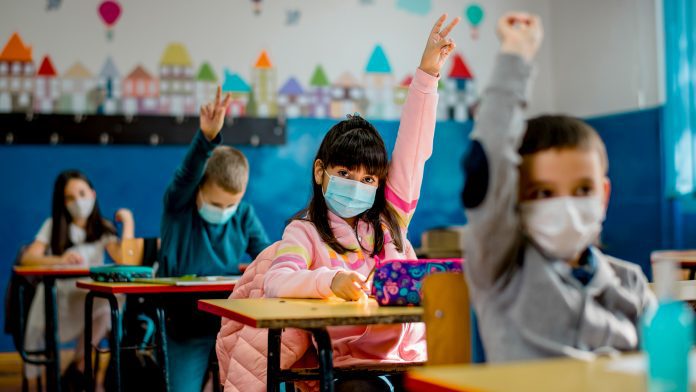
New research suggests that the spread of COVID-19 can be curbed in schools and preschools through adults wearing face masks.
The study, performed in Germany, illuminated that adults wearing face masks can potentially decrease COVID-19 outbreaks at schools. The researchers found that although the first identified cases of COVID-19 (index cases) in schools were predominantly children, the outbreak events were more severe when an adult was the index case.
The findings suggest that implementing face masks can significantly lower secondary cases. The team believes that mask-wearing should be obligatory in schools and preschools to mitigate the spread of the disease.
The study’s findings are published in Frontiers in Public Health.
Mitigating COVID-19 in schools
Currently, around 270 million cases of COVID-19 have been recorded worldwide, and the influence of children and adolescents in the spread of COVID-19 is still ambiguous, although closing education settings have become a standard method for stopping outbreaks.
However, closing schools have extremely detrimental effects on the well-being of children and adolescents, causing social isolation, stunting their learning and development, and resulting in an economic burden for their parents.
Dr Anika Kästner, the corresponding author of the study from the University Medicine Greifswald, said: “To avoid school closures at high incidence levels, it is important to identify factors contributing to the spread of COVID-19 infections in schools and preschools.”
In an effort to demonstrate how COVID-19 can be mitigated to keep schools open, the researchers examined the dynamics of COVID-19 infections in schools and preschools related to changes in hygiene measures, looking at the influence of these measures on the extent of outbreaks.
Dr Kästner said: “Our study was designed to provide further insight into the effectiveness of specific hygiene measures in schools and preschools.”
Impacts of face masks
For their research, the team employed routine surveillance data of Mecklenburg-Western Pomerania, Germany, between August 2020 and May 2021 in relation to COVID-19 infection in schools and preschools. The team examined outbreak events in relation to changing infection control measures throughout the pandemic.
The team partitioned these changes of measures into four phases, where schools and preschools were open in phase one (no mask obligation), closed in phase two (lockdown in Germany), gradually opened in phase three (with mask obligation in schools), and only emergency care was offered in phase four (lockdown in Germany).
They found that in preschools where faces masks were only recommended for adults, index adults caused on average 0.6 secondary cases in phase one and 2.8 secondary cases in phase three. Furthermore, for both phases one and three, children caused 0.5 secondary cases.
Dr Martine Sombetzki, the first author of the research from the University Hospital Rostock, said: “The reason for this difference between phases could be the increasing prevalence of the Delta variant, which causes more frequent infections in children.”
Implementing face masks in schools and preschools is challenging, especially for younger children; however, the results demonstrate that masks are effective for preventing infection outbreaks.
Dr Sombetzki commented: “Our results show that mandatory masking of teachers and caregivers and children at schools in the 2020 to 2021 school year each resulted in a significant reduction in the number of COVID-19 transmissions.”
The team highlighted that a limitation of their study is that vaccinations are not systematically registered in Germany, meaning that the influence of vaccines could not be quantified. Additionally, they also based their results on the assumption that infection control measures were robustly implemented in the studied schools. Nevertheless, the study shows that wearing face masks effectively mitigates COVID-19 infection.
“In a model analysis, mask obligation, for adults in particular, was shown to be effective in reducing secondary cases. We can therefore recommend all-time mandatory masking in schools for both children and adults. In preschools, mask wearing could also reduce secondary cases,” concluded Kästner.










